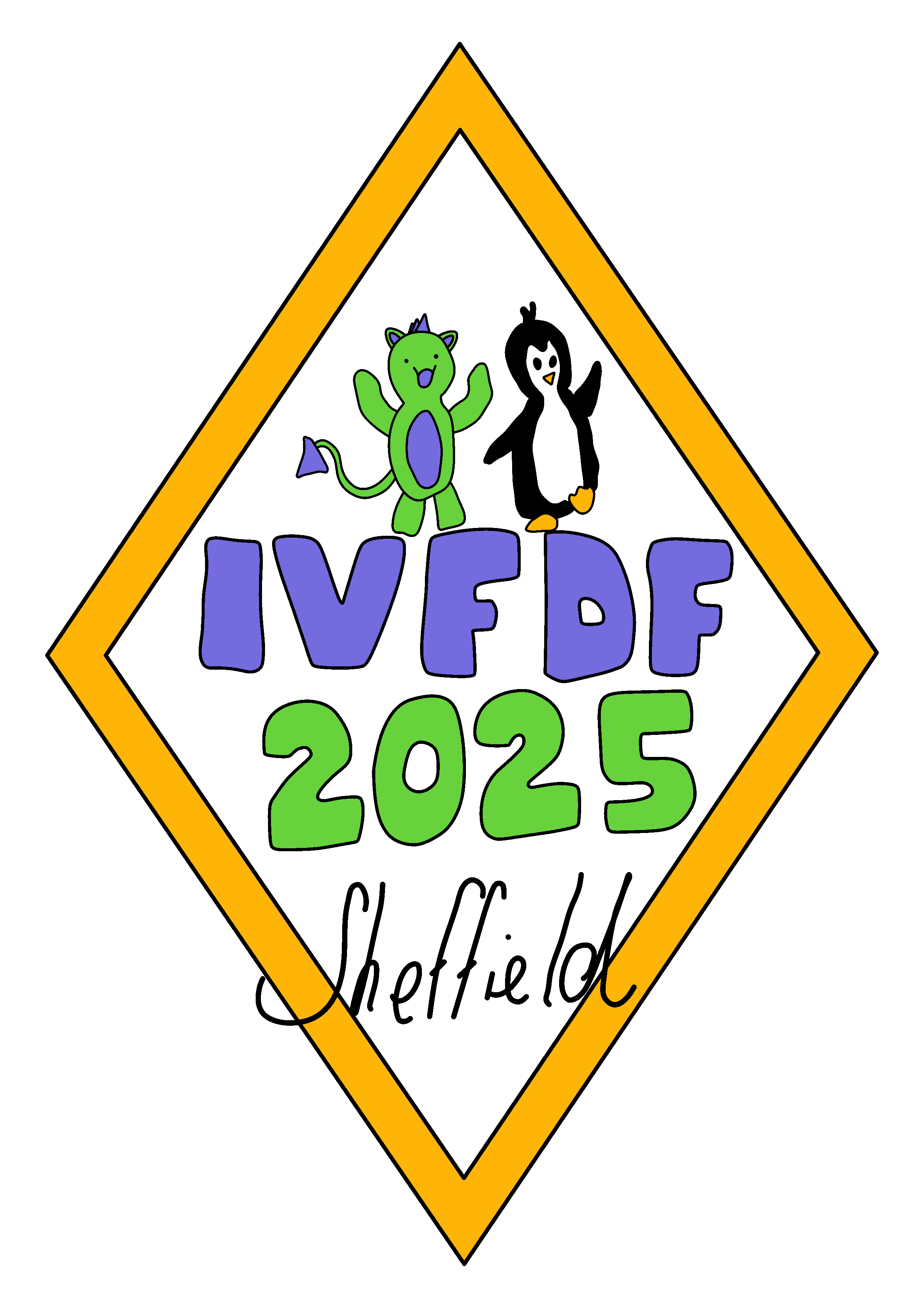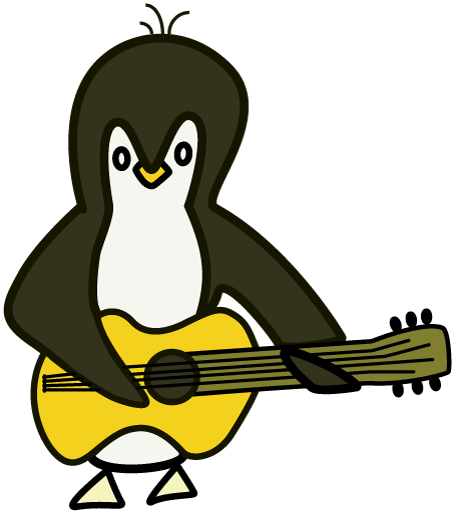Programme
2025 Programme
Unfortunately our programmes will not be arriving in time for the start of the event. We are hoping that they will arrive at some point on Saturday morning. Until then please have a look at this PDF programme.
Timetable
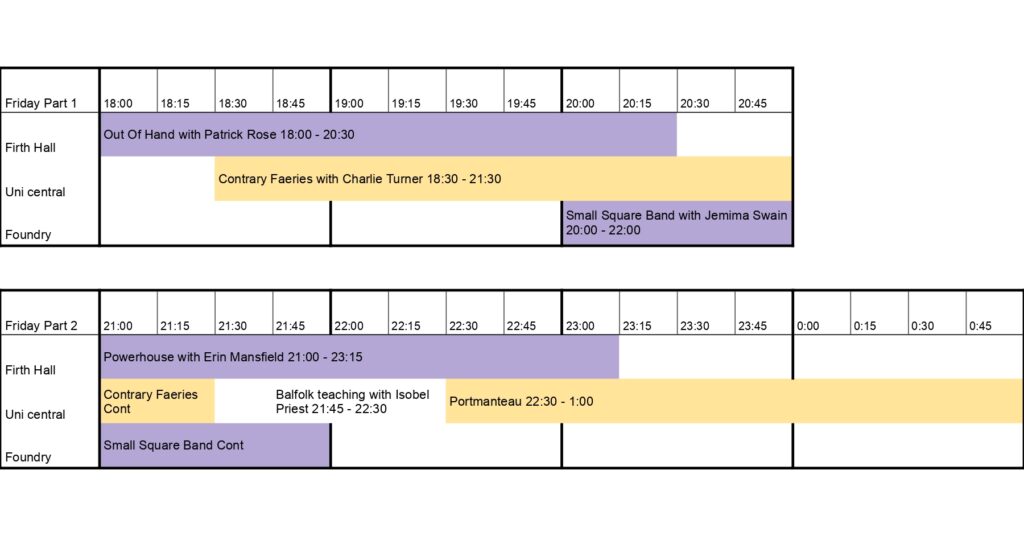
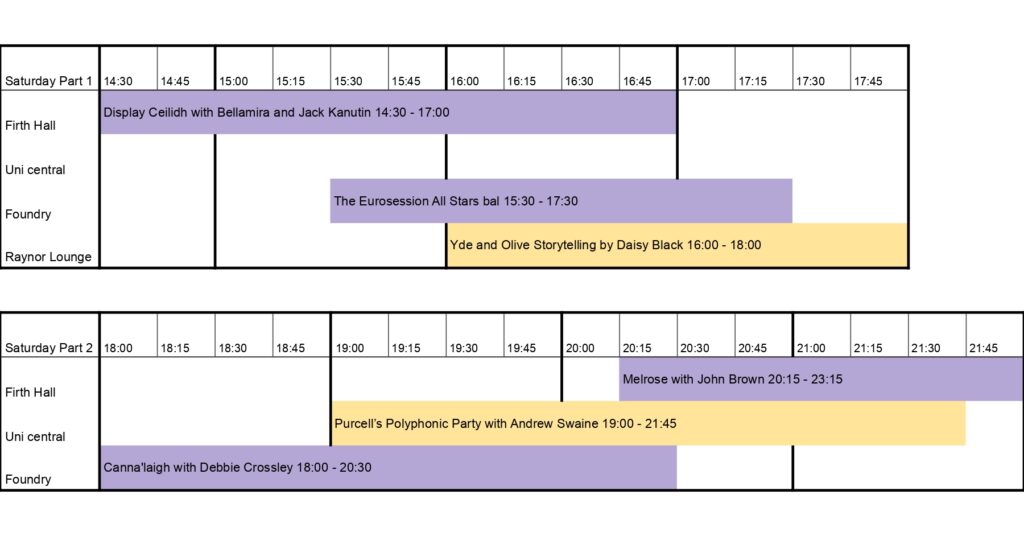
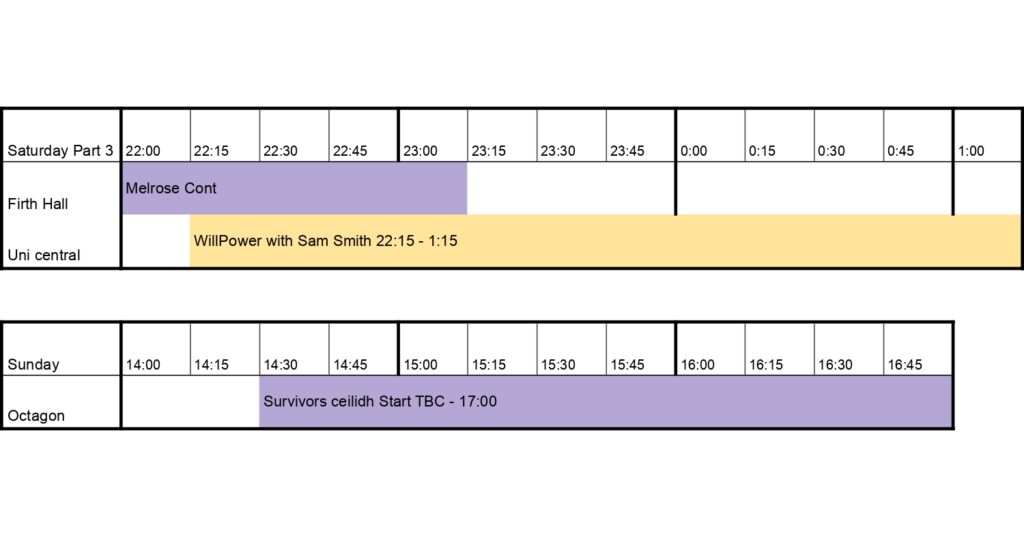
What’s On
Friday
Ceilidh 18:00 – 20:30 Out of Hand with Patrick Rose, Firth Hall
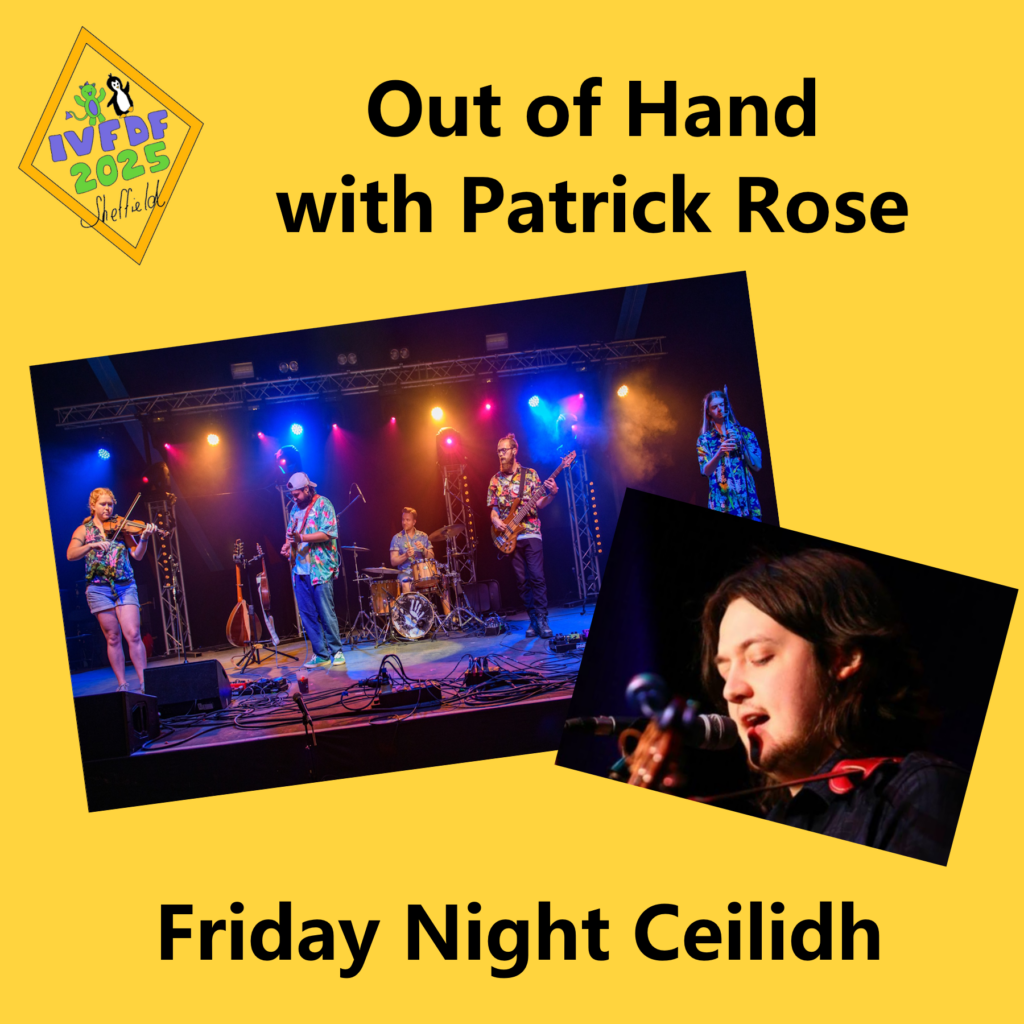
Out of Hand are a vibrant 5-piece Ceilidh Band in the UK known for their folk-rock style and high energy tunes. Young, bouncy, and a staple of the festival scene, they enjoy playing at weddings, barn dances, parties, and more! They put modern twists on traditional tunes as well as a load of their own tunes to give a thumping, danceable rhythm that will keep you on the dance floor all through the night
Patrick learned to call after a friend asked Whiskey For Six to run a ceilidh. His dance repertoire is varied, with both English and Irish dances and he has also written a few of his own.
We can’t wait for Patrick Rose and Out of Hand to kick off the weekend!
Contra 18:30 – 21:30 Contrary Faeries with Charlie Turner, Uni Central
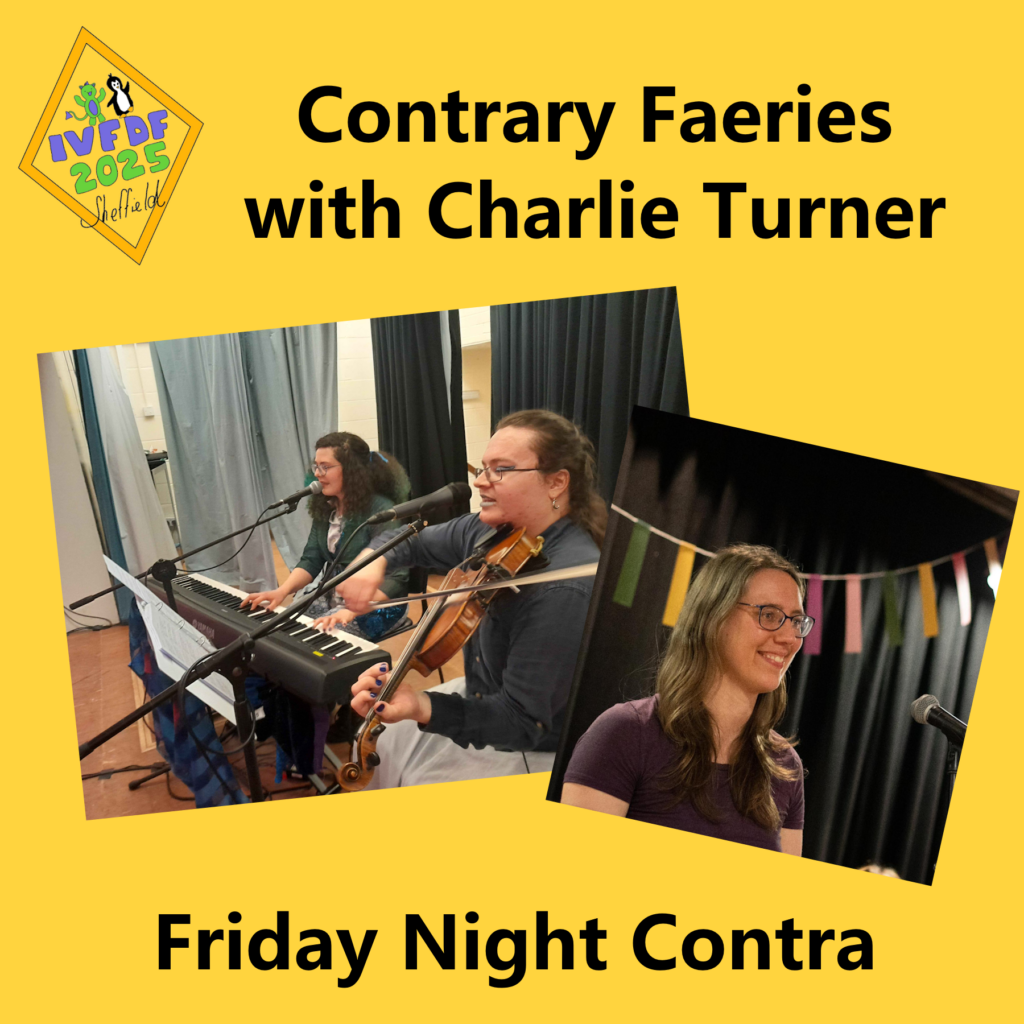
Contrary Faeries’ tunes and songs whisk dancers away to a land where you will forget your troubles, your cares, and the life you lived before… and if you’re lucky you might get to return. They like lively songs, sleepy jigs, funky reels, chaotic yet considered tune-dance matching, gender-free role terms and queer joy on the dance floor. Contrary Faeries are Joshua Webster (they/them) on fiddle and Sol Loreto-Miller (they/them) on piano, who first played together at Sheffield Scratch Contra.
Charlie has been dancing since she was 2 and contra dancing since about 2010, when university society Warwick Folk first took her on their minibus to Alcester Contra. You may have previously danced to her calling at festivals and weekends such as Sidmouth, Chippenham, Stegastomp, Halsway and IVFDF (including the now-famous hour-long constant contra medleys!) or dances such as San Francisco, London and Paris. She is a founder of Cambridge’s gender-free contra dance series,
Contrabridge.
Playford 20:00 – 22:00 Small Square Band with Jemima Swain, Foundry
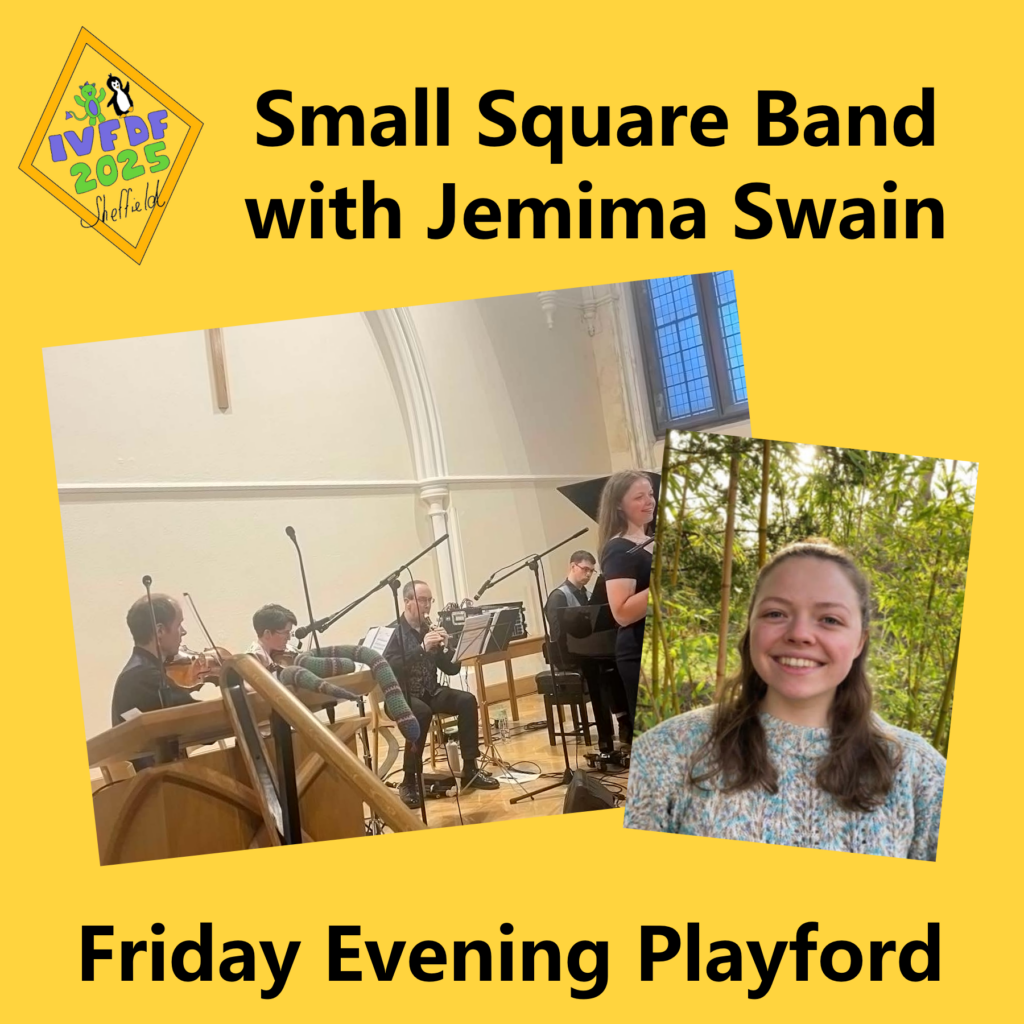
The Small Square Band are a 4-piece (fiddle, viola, recorders, piano/keyboard) band based in Cambridge who specialize in playing for Playford dances. They aim to combine musical excellence and have a keen interest in how Playford tunes fit their dances. Enquiries to the band leader, Matthew Vernon, at
matthewv+ssb@coriolis.greenend.org.uk.
Jemima Swain calls Playford with the famous Round in Cambridge, and will be bringing us an exciting mix of Playford and Country Dances!
Ceilidh 21:00 – 23:15 Powerhouse with Erin Mansfield, Firth Hall
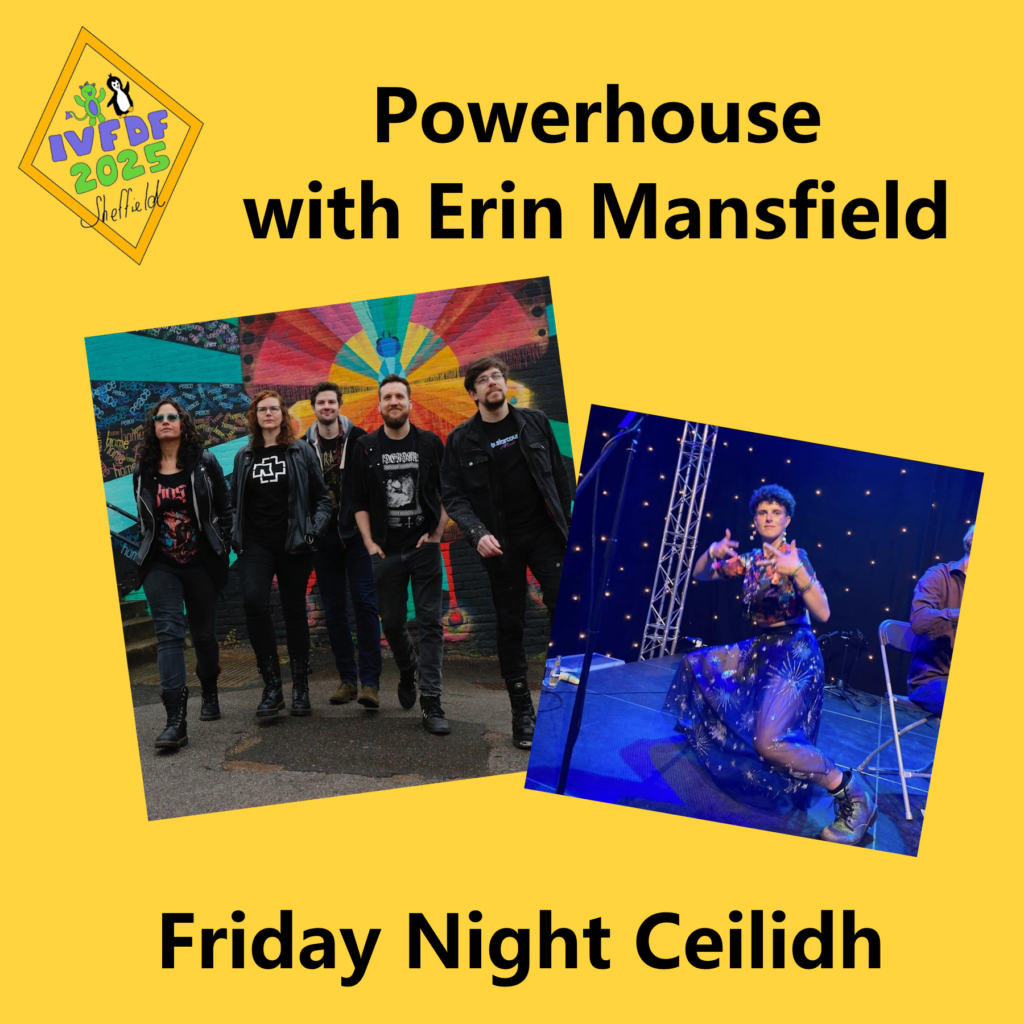
Powerhouse are a five piece ceilidh band from Sheffield brought together by a mutual love of rock, beer, general geekiness, and ceilidh. They combine traditional tunes with rock riffage, heavy metal, and pop culture (movies, video games, you name it) to tempt even the most determined non-dancer!
Erin has been immersed in many genres of music and dance since childhood, though her true love lies with traditional and contemporary folk music, song and dance. This love led her to begin participating in English social folk dance (ceilidh/country/morris) as a child; before turning to calling as a teenager. She has since broadened her horizons and is an accomplished musician as well, playing a variety of tin/penny whistles, recorders and flutes; as well as the melodeon and vocals. Erin first began calling in 2016 with a casual gig at a friend’s party where dancing went on until the early hours of the morning!
Bal 22:30 – 01:00 Portmanteau, Uni Central
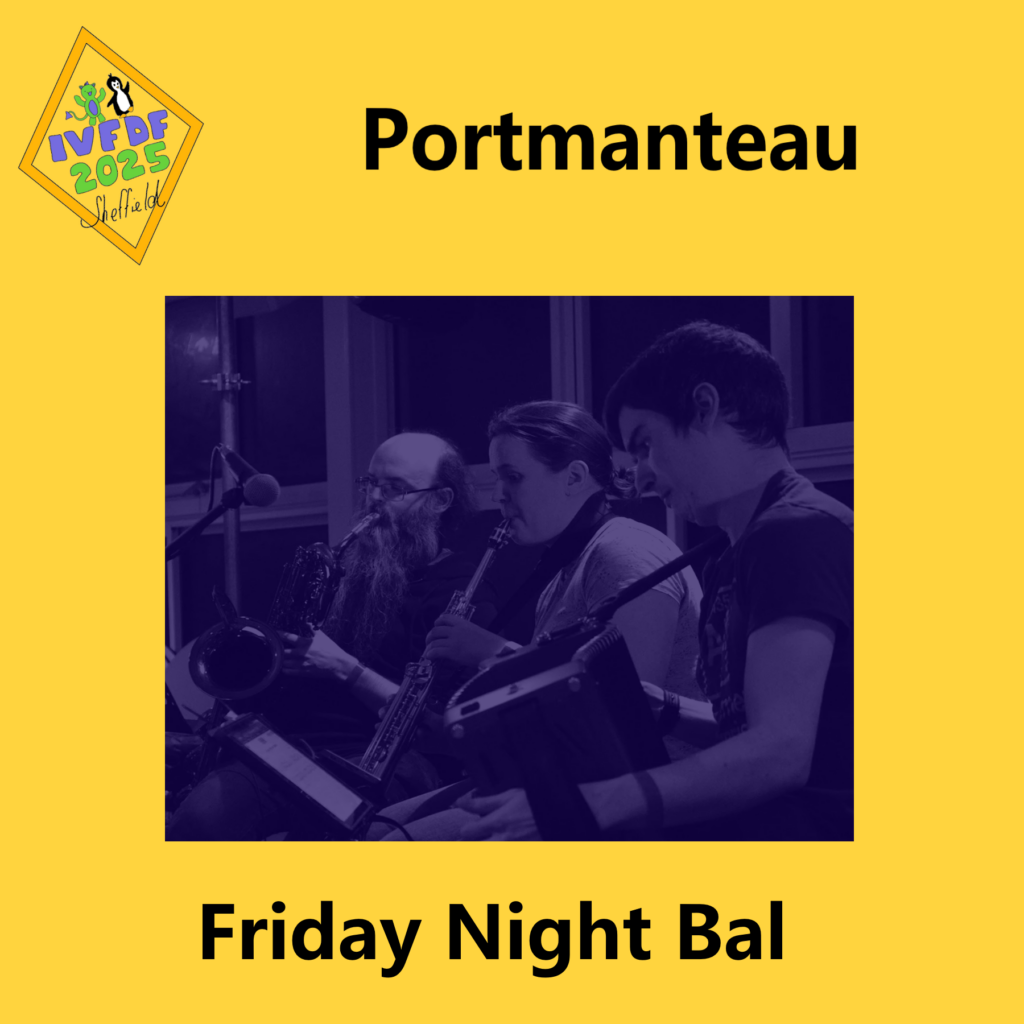
Traditional Balfolk dance tunes with a touch of modernity. Portmanteau’s blend of acoustic instruments and subtle synthesizers creates a captivating musical experience that honours tradition while embracing the future. Portmanteau is a breath of fresh air on the balfolk scene. With their unique blend of old and new, they’re sure to get you up and dancing.
The genuine connection between the band members shines through in their music, with deep rich harmonies and driving rhythms.
Arrive from 21:45 for a beginners workshop with the wonderful Isobel Priest before the dance.
Saturday
Display Ceilidh 14:30 – 17:00 Bellamira with Jack Kanutin, Firth Hall
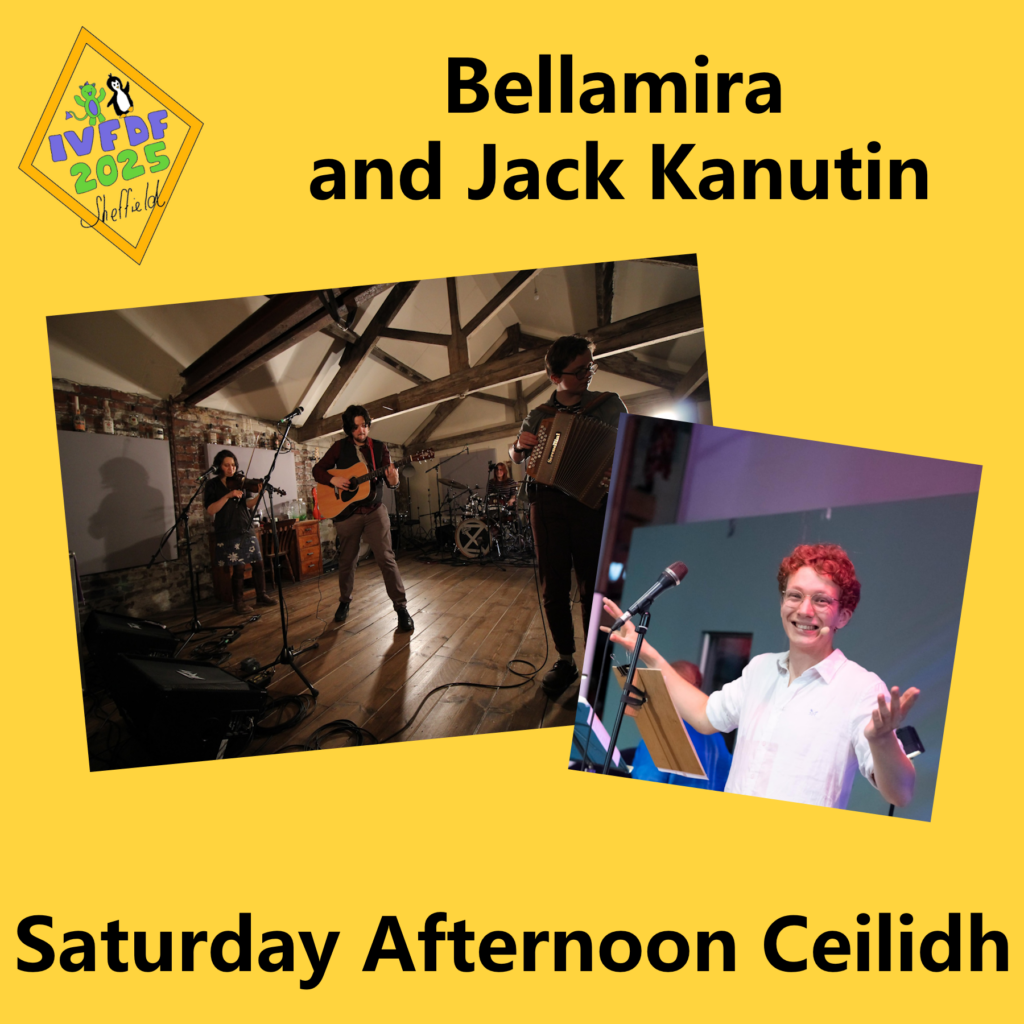
Bellamira are a small, tight band with a big sound and an inexhaustible sense of fun. Robyn’s squeeze-box is punchy and exuberant. Josie layers ferocious fiddle harmonies, and her singing is powerful and unaffected. Paddy channels the energy of the sea shanty in his guitar and singing. Mina’s drums lift the dancing and sparkle with atmosphere and joy. Together, we fully imbue Sheffield’s world-famous folk song and music scenes—energy, spirit and celebration. They create dance music that takes you on a journey.
Jack has been folk dancing for as long as he can remember. He started calling at Bristol University and organised IVFDF 2021 while studying there. Over the past five years he has refined his style, bringing a blend of energy, clarity, and enthusiasm to every dance he calls.
Bal 15:30 – 17:30 The Eurosession All Stars, Foundry
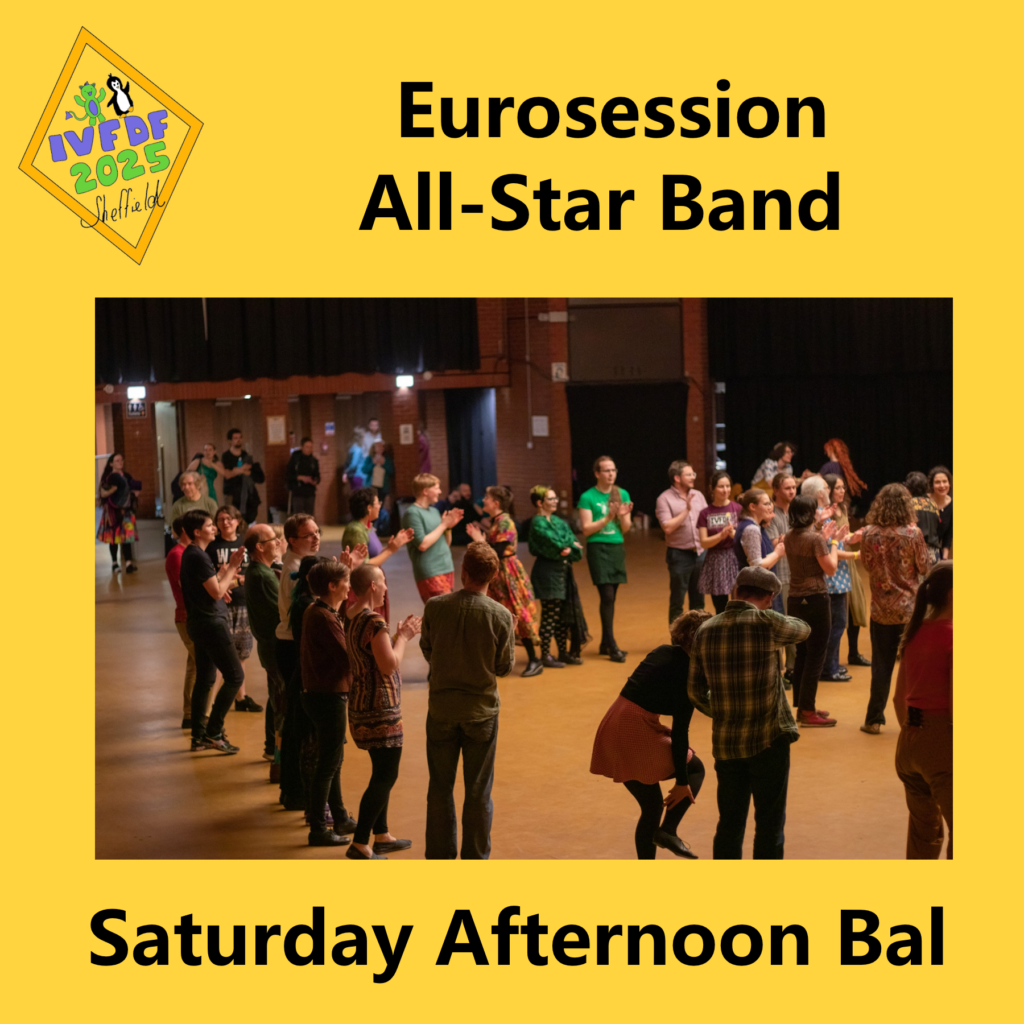
Sheffield Eurosession has been a part of the UK’s balfolk session scene for many years, attracting musicians and dancers with a passion for European music and dance. Many session regulars are also fantastic performers and dance leaders at festivals across the country. Today’s line-up comprises Nicky McConkey (violin), Jo Veal (clarinet), Andrew Swaine (accordion) and Anna Pack (diatonic accordion & clarinet). Performing for ceilidhs, contra dance and Playford as well as balfolk, between them the quartet also perform in festival bands Hekety, Chaotic Good, Oscina, Fernleaf and many more. Expect a mixture of traditional, contemporary and self composed melodies, with soaring improvisations, high energy, gentle sensitivity and humour in their playing. Sheffield Eurosession meets on the 2nd Thursday of the month at The Shakespeare in Kelham Island, usually with a dance workshop before a wonderful open session.
Yde and Olive Storytelling 16:00 – 18:00 Daisy Black, Raynor Lounge
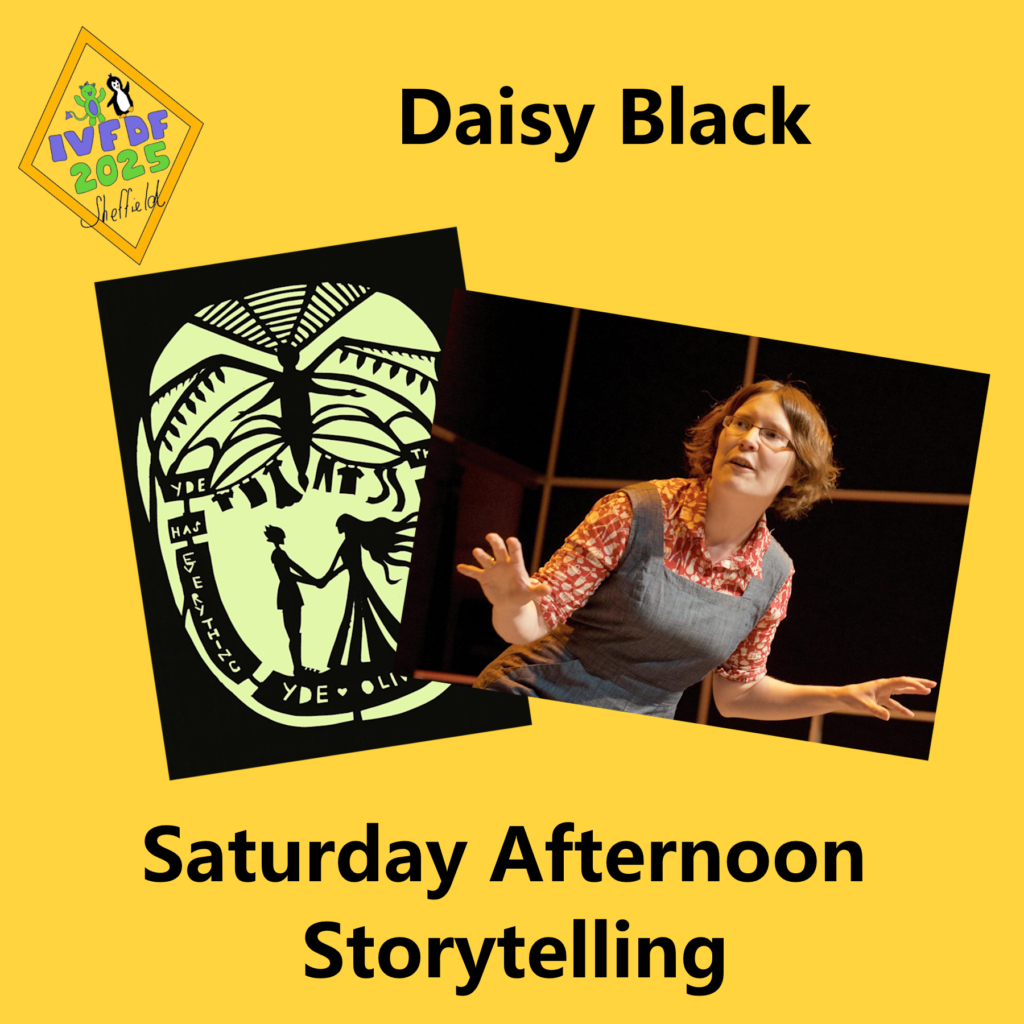
Yde grew up reading of knights, sieges and her own mother’s daring deeds. So when threatened with an unwanted marriage, she knew she’d rather fly across the frozen sea than sit around and wait for it to happen. Disguising herself as a man, Yde cuts her own paths to freedom, fighting battles, outwitting thieves and winning over monarchs. Until one day, she meets her match in Olive: a woman whose spirit is every bit as courageous as her own…
Storyteller and academic Daisy Black presents a remarkable thirteenth-century tale of disguise, high adventure, public baths, straight-talking angels, and the power of queer love. Weaving together medieval narrative with modern folk song, this performance will take you from birthing chambers to battlefields, castle chapels to court chambers crackling with gossip.
Scottish Country Dancing 18:00 – 20:30 Canna’Laigh with Debbie Crossley, Foundry
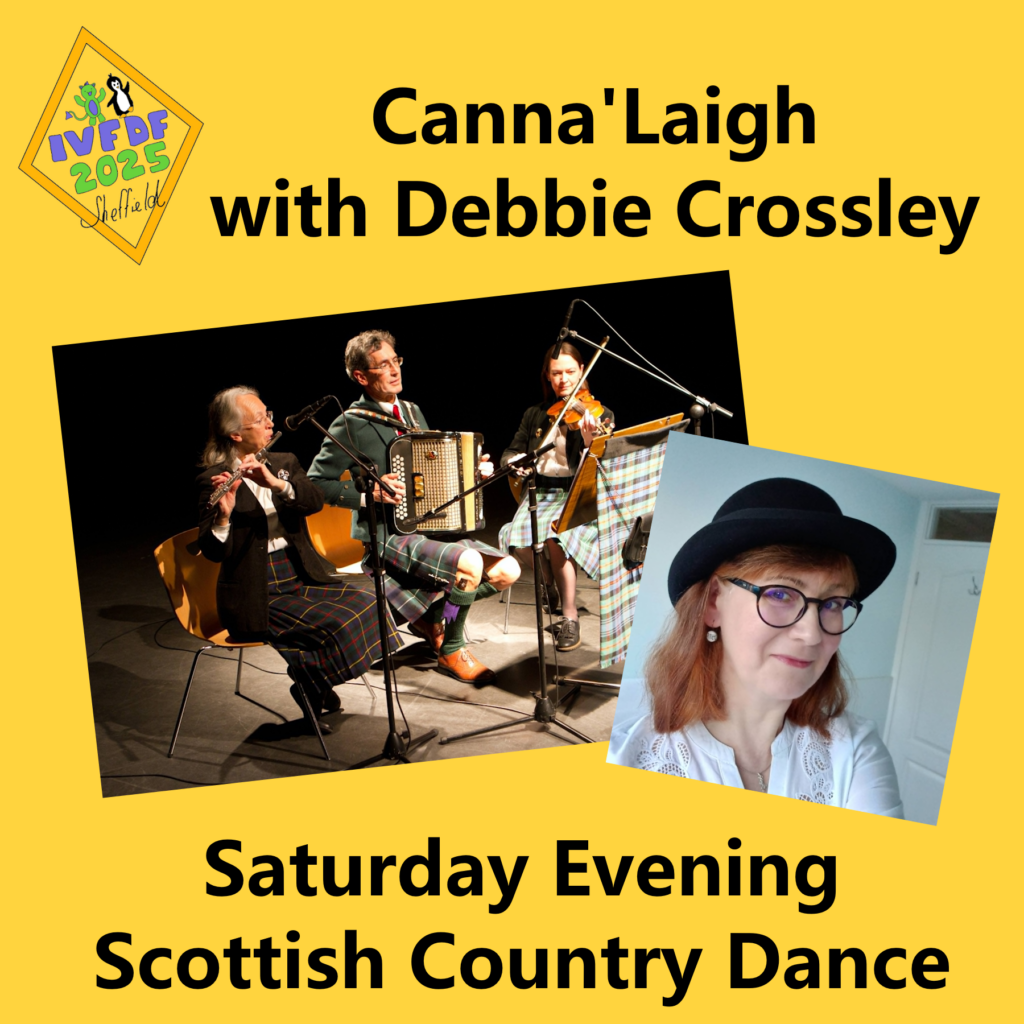
Musicians Jill and Bernard Blackwell and MC Debbie Crossley will lead you through a varied programme of well loved Scottish Country Dances.
Suitable for all.
The Programme:
Good-Hearted Glasgow, The Royal Deeside Railway, Midsummer Common, The Carefree Highway, Langholm Fair, The Aviator, Two Gray Cats, The Falkirk Lass, Pelorus Jack, Shiftin’ Bobbins, Friendships, Gaelforce Wind, The Irish Rover, The City of Belfast, The Highland Rambler
Scottish Dance Crib Sheet
Playford 19:00 – 21:45 Purcell’s Polyphonic Party with Andrew Swaine, Uni Central
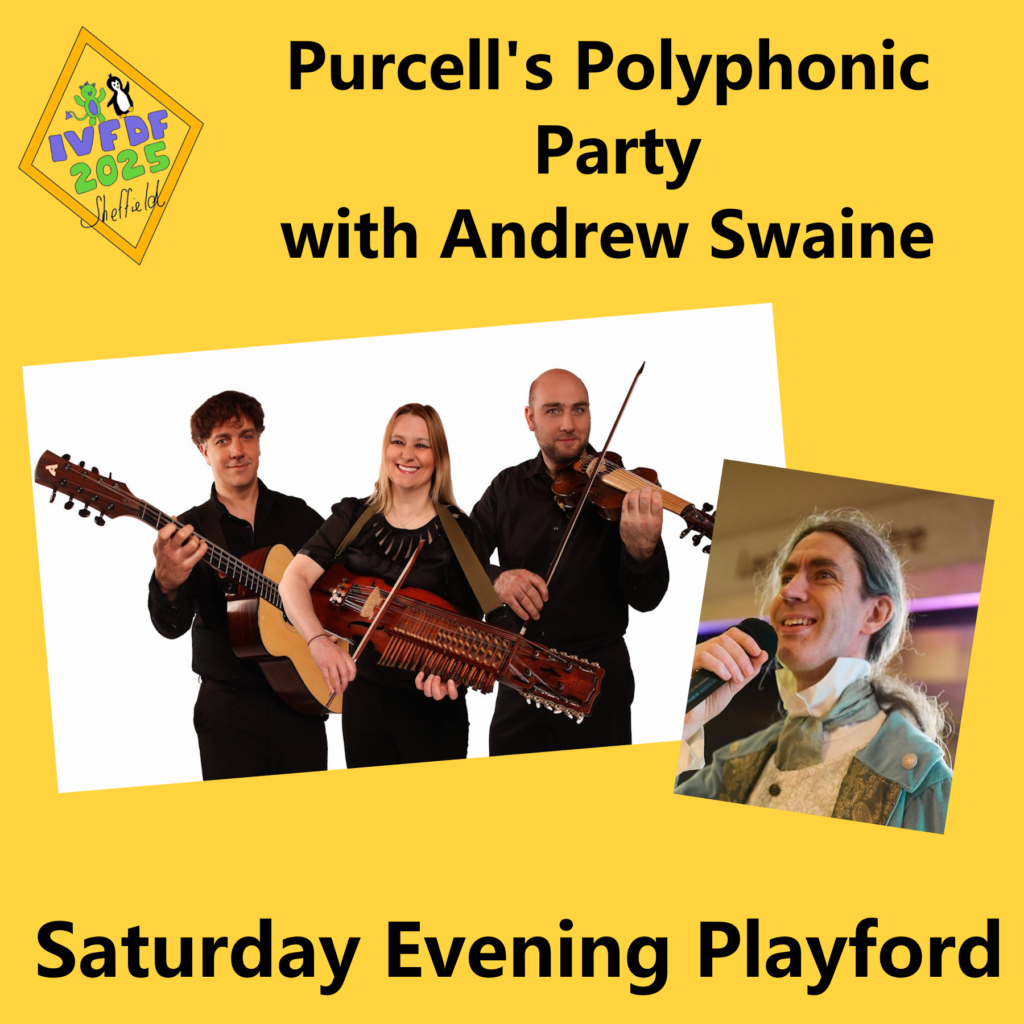
Purcell’s Polyphonic Party are a trio of musicians come together to combine their love of Purcell, Playford, Baroque and the Nordic Noir. With 99+ strings to their armoury of instruments you can be assured that an evening has plenty of variety. The multi-talented trio will transport you via the medium of song music and story or have you dancing the night away.
Andrew Swaine is a wonderful local caller with incredible knowledge of all things dancing, Playford, and the history of the dances. He will expertly guide us through an evening of joyful dances.
Ceilidh 20:15 – 23:15 Melrose Quintet with John Brown, Firth Hall
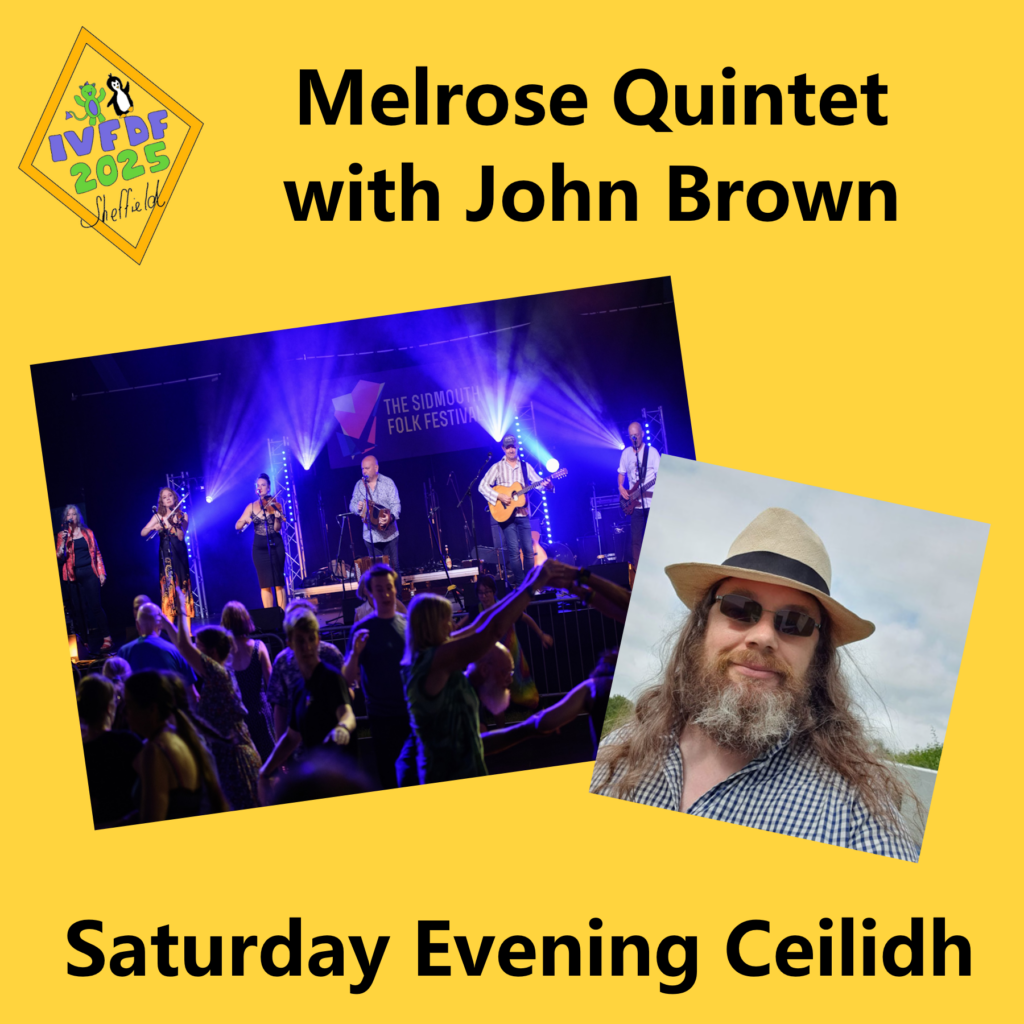
Prepare yourself for one of the most memorable ceilidh bands to emerge in recent years. Melrose Ceilidh Quintet combine decades of dance band experience with powerful harmony singing. Singing for dancing is their trademark, and with acappella specialists Melrose Quartet at their core, plus Nigel Holmes on bass (Hekety, Glorystrokes), they make a truly joyous sound. “Stunning danceable rhythms, and an amazing choice of music that included superb vocals too. The Melrose Ceilidh Band raise the bar across the whole of the ceilidh-dancing world.”
John Brown is a well established ceilidh caller, working out of Sheffield. He got into calling through Sheffield Ceilidhsoc and has been calling for Ceilidhsoc and for others ever since. These days he calls at a variety of events, from small private functions, to regular ceilidh Series and folk festivals.
Contra 22:15 – 01:15 WillPower with Sam Tetley Smith, Uni Central
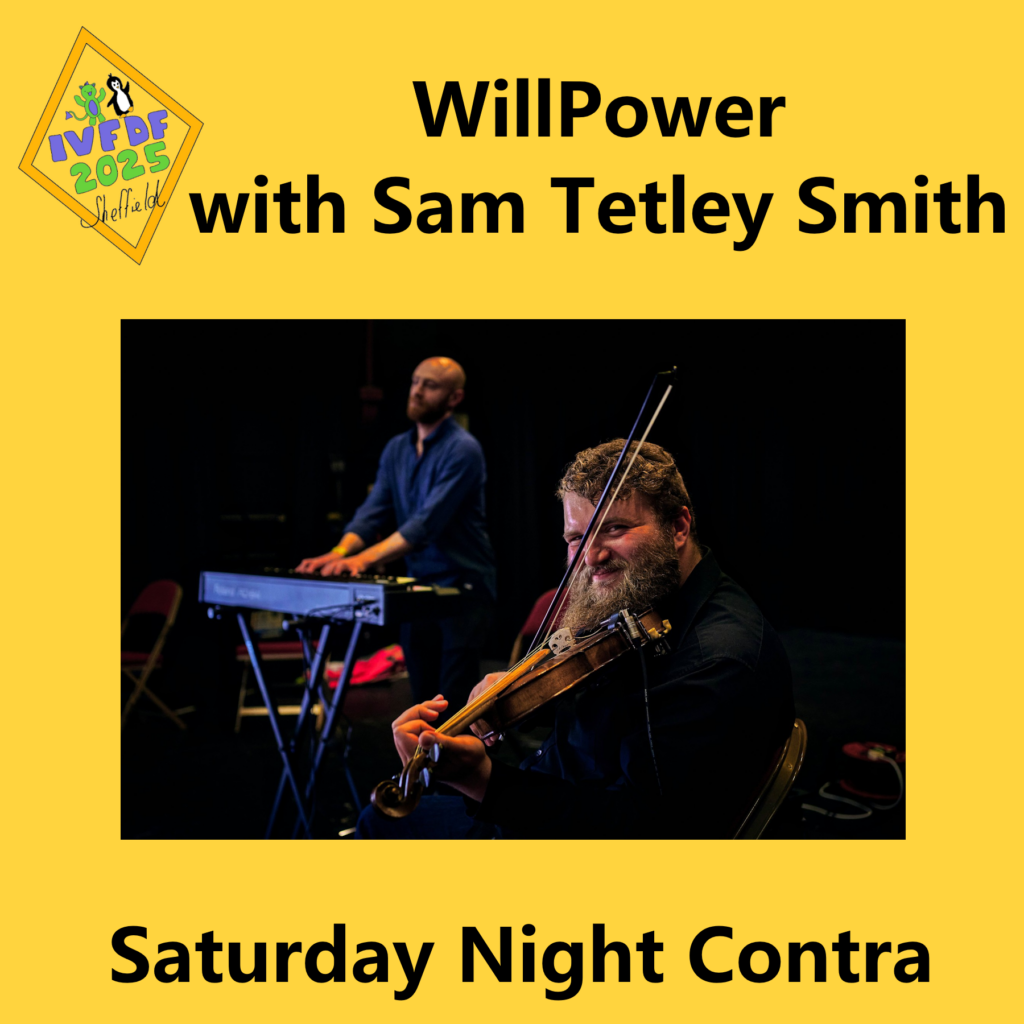
WillPower is the potentially lethal combination of Wills Allen and Chamberlain. Both members of Club Débris and the Brown Boots Boogie Band, here they get to be a two-man-multi-tradition-groove-machine!
Sam Tetley Smith started calling through Sheffield Scratch Contra and is taking the contra scene by a storm.
Sunday
Survivors Ceilidh TBC – 17:00, Octagon
Workshop Timetable
Saturday Morning
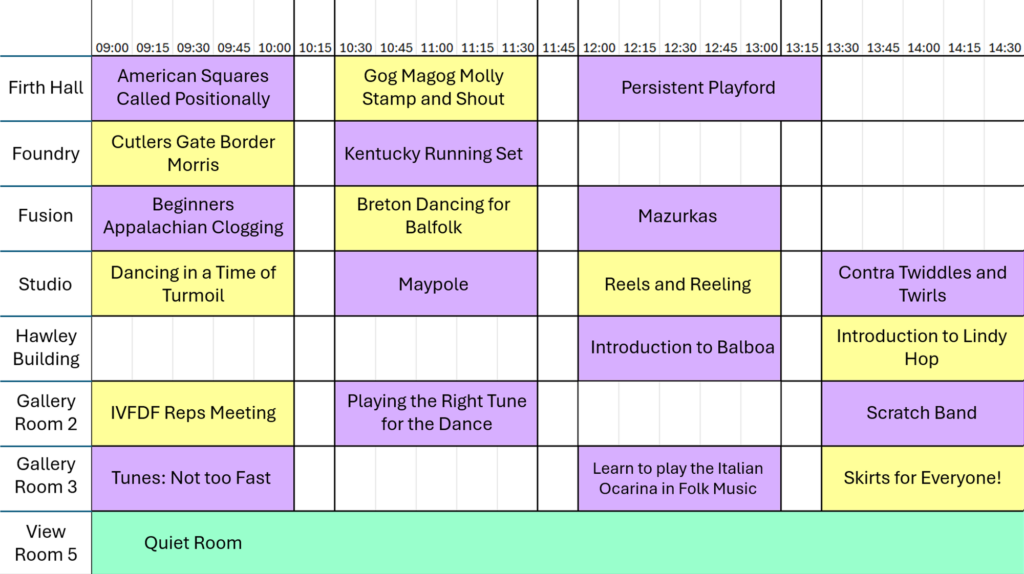
Sunday Morning

Workshops
Saturday
09:00 – 10:15
American Squares Called Positionally with Colin Hume, Firth Hall
Positional calling is a technique of gender-free calling which refers to the dancers only in terms of their position. It’s a very different mind-set from just replacing “Men and “Women” by “Larks” and “Robins” – it needs a new approach to both walkthrough and calling. Louise Siddons has championed this for calling contras, and at IVFDF last year Colin was the first to apply it to squares. Colin will present a range of squares using positional calling, some of which you will find challenging but all of which you should find fun. They are traditional-style but with interesting variations, so you need to know standard figures and be able to react quickly to the calls.
Cutlers Gate Border Morris, Foundry
A Morris workshop where Culters Gate would teach one of their own dances, going through the stepping and style.
Beginners Appalachian Clogging with Janet Hutchinson, Fusion
Come along and try Beginners Appalachian Clogging and learn a whole routine. Music provided by Steve on harmonica. Wear hard soled shoes or taps.
Dancing In A Time of Turmoil with Elizabeth Lawson, Studio
English fifteenth century dances from the Gresley manuscript: sometime between 1450 and 1500 the steward of the Gresleys of Drakelaw copied a handful of dances into a notebook. By chance this notebook survives and we’ll be trying some of them out. If you’ve been to my workshops before, there will be some new ones as well as old favourites. If you haven’t, welcome to a style of dance that’s both very different and strangely familiar.
IVFDF Reps Meeting with John Brown, Gallery Room 2
Come represent your society and shape the future of IVFDF! Contact us if you’d like to have anything added to the agenda.
Tunes: Not Too Fast with Tim Pillinger, Gallery Room 3
Are you a beginner musician? Are you a beginner on a new instrument or tradition? Are you a fantastic musician who just likes to chill? Do you have a tune which is fun but not hard to share?
Then this is the workshop for you. Tim will arrive with a metronome and a supply of dots for some easy tunes and allow the workshop to develop from there.
https://altonsteadysession.wordpress.com/wp-content/uploads/2025/01/steady-session-complete-3.pdf
https://bristolfolksoc.github.io/tunes.html
10:30 – 11:45
Gog Magog Molly Stamp and Shout, Firth Hall
Gog Magog Molly is an easily-spotted kaleidoscope of colour, formed in 1996 and drawing from the traditional dances of the Cambridgeshire fens as well as a range of other inspirations, all done with distinctive geometric precision and energetic step-hop. We will teach one of the dances we made up ourselves.
Kentucky Running Set with Annabel & Nigel Sharp, Foundry
Kentucky Running Set is a fun and exhilarating form of country dancing, from the Appalachian Mountains of the USA. KRS is usually danced in square sets of 4 couples, though other numbers work fine. Each couple has their own figure, bringing in the other couples, who join in with the move. There’s an “all swing and promenade” chorus after each figure. Come and have a go at figures such as Wild Goose Chase, Polka Swing, Shoot the Buffalo and Rattle Snake Twist.
Breton Dancing for Balfolk with Jean-Christophe Denis, Fusion
Do you feel sad that you don’t have the chance to exercise your pinkies at IVFDF? Come to this workshop, pinkies workout is guaranteed! We will focus on learning Breton dances played regularly at balfolk events; we travel and dance around Brittany, from joyful couple dances from the coast to energetic chain dances from the “mountains”. We will move from the French-speaking areas to discover the Breton and Gallo-speaking counties. You will dance to traditional but also “contemporary traditional” music. Open to all. Cider is not provided, but the French accent is!
Maypole with Elizabeth Lawson, Studio
Maypole dancing is simply the best. It’s also the most accessible form of folk dancing. Whether you just want to have a go, or learn how to run maypole sessions yourself, this workshop is for you. Children are particularly welcome. Prepare to get tangled!
Playing the Right Tune for the Dance with Sol Loreto-Miller & Joshua Webster, Gallery Room 2
Have you ever wondered how bands just “know” the right tune to play for a dance? Or how to know what a dance is like from looking at the card? Sol and Joshua of Contrary Faeries will share their advice (and mischief) on how to fit the right tune to each dance. Most relevant to contra, but all styles are welcome. A basic level of familiarity with contra dancing and contra/ceilidh tune playing is helpful (we won’t play together in the workshop but there will be some tune selection exercises).
12:00 – 13:15
Persistent Playford
What happens when you look at Constant Contra and go “yes…but Playford”. Allow a handful of callers to guide you through a persistent string of Playford dances – no walkthroughs and no interruptions. Limited teaching of figures will be done at the start.
Magical Mazurkas with Susannah Diamond, Fusion
The marvelous couple dance from European balfolk traditions… Wear shoes that turn easily, and come and connect, turn, pause, pulse, smile.
Reels and Reeling with Reg Stones, Studio
An introduction to dancing Reels of 3 and 4 in some popular Scottish and English Country Dances with variations to the “standard form “. They will be Fun !!
Introduction to Balboa with Gaurav Yadav, Hawley Building
Come discover Balboa, a playful swing dance born in 1920s Southern California! Known as a dancer’s dance, you’ll learn smooth moves that let you groove to the quickest jazz tunes while staying connected to your partner. Join Gaurav and Beth to learn the basic steps of this classic dance – no experience needed!
Learn to play the Italian Ocarina in Folk Music with Robert Hickman, Gallery Room 3
The ocarina is a 19th-century ceramic wind instrument with a pure/haunting tone. You will learn to play the ocarina starting from the basics, and learn how they can be used in the performance of many kinds of folk music from Irish, to balfolk and Scottish bagpipe music.
Robert has been playing ocarinas since 2011, and has taught at festivals like Sidmouth, Chippenham, and the Budrio ocarina festival in Italy. This will be a progressive workshop suitable for ear players and note readers, with 12 instruments available to lend, hand made by Robert. Taught using G ocarinas.
13:30 – 14:45
Contra Twiddles and Twirls with Rob Humphrey, Studio
Have you seen other people adding in extra turns in a contra dance, or had a partner lead a flourish and you weren’t quite sure what was happening, and want to know more? This workshop will teach a number of moves that can be added to contra dances, allowing creativity and variations within figures without interrupting the flow of the dance. Suitable for anyone, although at least some contra experience would be beneficial.
Intro to Lindy Hop with Peter Marsh & Rosalind Williams, Hawley Building
Lindy hop is a bouncy improvised couples dance, danced to swing jazz music, that emerged from African American communities in the 1920s and 30s, but it is still widely danced today! In this workshop we will show you all the basics you need to know to take to the social dancefloor.
Scratch Band, Gallery Room 2
Learning to play in a dance band and playing through the tunes for the Survivor’s Ceilidh on Sunday. Come to one or both if you want some practice before the dance. No previous experience playing in a band required. Bring an instrument.
Scratch Band Music
Skirts for Everyone! with Robert Hickman & Louise Siddons, Gallery Room 3
Skirts are fun to dance in regardless of their traditional gendered connections, so lets break that! Learn about different kinds of skirts, how to style them, and how to find twirly ones. We invite attendees to show off their favourite dance skirts (and dresses) to others.
Sunday
09:00 – 10:15
Scottish Reeling with UCL CalSoc, Council Chambers
Fancy trying out a bit of Scottish country dancing?
Whether you are a regular at local ceilidhs or have never heard of reeling before, we would love for you to come along and give our beginner-friendly workshop a go! Reeling is a social, beginner friendly form of dancing with most dances using repeat patterns of basic moves (setting, turning, casting off and figure of eights). There are over 11,000 reels that exist nowadays although don’t fret, we’ll only be teaching a few!To keep updated with any of our events check out our instagram: @uclcalsoc .
(Cancelled) Dance like the Tudors! with Felicity Maxwell, Firth Hall
This is your chance to try a few dances that were all the rage in the royal courts and country houses of Tudor England and Renaissance Europe, such as the stately Pavane (processional), Allemande (circle dance), and showy-offy Galliard (semi-improvised). We will also learn a bit of dancefloor etiquette and the historical/philosophical contexts that make these dances really special. Hamming it up is encouraged!
Crooked Contras with Sam Tetley & Joshua Webster, Uni Central
Contra dances to tunes with abnormal phrase lengths. Probably mostly beginner-to-intermediate.
Boggarts Breakfast Border Morris, Foundry
Learn a dance from Boggarts Breakfast, who are known for our geometric and non-traditional take on border morris.
Write a Folk Dance! with Charlie Turner & Nix Goldowsky-Dill, Fusion
May Heydays festival’s choreography competition is looking for “dances that are explicitly designed to exploit being gender-free”. Come and learn what makes up a folk dance and collaborate to write your own entry! Open-minded test dancers and new ideas encouraged!
Footwork For the Terrified with Elizabeth Lawson, Studio
Nobody’s born being able to do fancy steps. This workshop is about learning basic setting and travelling steps to build confidence in a supportive environment.
Sea Shanty Part Singing with Bill Curtis, Gallery Room 2
During this workshop, come along to learn to sing Sea Shanties in four-part SATB choral harmony, without accompaniment. The ability to read music is beneficial, but not essential, as we will go through all parts during the workshop. Similarly, some experience of choral singing is beneficial but not essential, and the main focus is on enjoying the songs! As this is not a dancing or instrumental workshop, no particular footwear or instrument is required. This workshop is designed for all genders, but you may choose to sing whichever register you feel most comfortable with.
10:30 – 11:45
Dances for the Brave with Jacob Steel, Firth Hall
A workshop of hard, ultra-hard and not-actually-that-hard-but-quirky dances in a mixture of contra and English social styles, written and taught by a chaos theorist and folk dance writer who gets bored easily and whose work tends to spill over into his play.
WARNING: this workshop is specifically aimed at more experienced dancers who want a challenge. While beginners who want a challenge are also welcome, especially if you found the Saturday dancing too easy, please be aware that you may get lost a lot.
All dances called are online at https://sites.google.com/site/dancesforthebrave/
Contras in Becket Formation with Gaurav Yadav, Council Chambers
Come discover why Becket formation is a brilliant gateway to contra dancing! With two lines facing each other and simple, flowing movements, Becket naturally breaks down role barriers and keeps everyone connected. We’ll start with straightforward dances and gradually build up to more playful ones, showing how this formation makes contra both accessible and fun. No previous contra experience is needed.
Inventing English with Louise Siddons, Firth Hall
What do you get when you combine the variety and energy of Ceilidh and Playford with the flow and creative choreography of contra? Join us for some of the best inventions of the living tradition of English social dance — with cracking music to dance them to.
Traditional North West Morris with Rumworth Morris, Uni Central
The Rumworth Morris was founded in 1976 in Bolton, Lancashire with the aim of dancing NW Morris as closely as possible to traditional style. Rumworth are now based in Sheffield and are widely regarded as the Guardians of the Tradition.
They will be teaching a dance collected from a traditional team in Colne in east Lancashire which is lively, energetic and great fun to dance. it was traditionally danced in shoes, not clogs.
No previous experience of this style of dance is required, just enthusiasm and hopefully a sense of rhythm.
Dances of the Yorkshire Dales with Peter Barnard, Foundry
This workshop will feature some of the over 50 dances (a mixture of folk dances and old time dances) collected in the 20th century in the Yorkshire Dales. In some cases there are several different versions of a dance. There are dances for sets of couples as well as couple dances, and they were danced in the villages throughout the Dales – a regular point of social contact for those who lived in these remote villages.
Appalachian Step Dancing for Beginners with Feet First Appalachian Dancers, Studio
Appalachian is a fast, fun style of dancing done to Old Time American fiddle music. Related to tap dance, the style takes its roots from Irish step dance and English clogging but with many other influences mixed in.
Feet First were one of the first teams to bring Appalachian to the UK in the 1980s. We choreograph our own dances based on traditional steps, but we are above all a “performance” team with an emphasis on energy and fun. By the end of this workshop you should start to understand the “feel” of the style, and know enough to be able to dance a short routine.
Wear taps or hard-soled shoes if possible.
Niggun Sing (Wordless Song Session) with Isaac Montagu, Gallery Room 2
A tune session without instruments, a song session without words. Rooted in but not limited to niggunim, wordless songs from Ashkenazi Jewish music, Isaac will facilitate a participatory session, now an IVFDF annual staple. All are welcome, no prior knowledge is needed.
Body Percussion with Sara Marshall-Rose, View Room 4
Come and learn how to use your body to create music. This is a fun and accessible workshop that explores body percussion and song.
Folklore and Foraging with Max Moorcroft, Meet at the Concourse
A guided walk finding, smelling, touching (and tasting if you like!) plants. With some extra facts, foraging and folklore. Please feel free to bring along and share your folky stories relating to plants too.
12:00 – 13:15
Constant Contra
Just Keep Dancing! Allow a cavalade of IVFDF’s finest contra dance callers to guide you through a constant stream of contra dance – no walkthroughs and no interruptions! If you want a break or to ask somebody else to dance, just stop dancing at the end of the set and join back in when you’re ready. Suitable for dancers comfortable with common contra figures.
Blues Dance Taster with Katy McCalister, Council Chambers
Beginner-friendly introduction to an African-American partner dance. Find your groove, learn some moves and get dancing to some classic blues tunes. No experience or partner is necessary.
Scottish Country Dance with Debbie Crossley, Firth Hall
Ceilidh dancing with added decorum – Scottish Country Dancing adds precision to exuberance and control to abandonment. More a cream tea than a pint of beer, love both and add another facet to your joy of dancing in sets. The session will cover basic steps and formations and lead up to dances written by the local branch of the Royal Scottish Country Dance Society for their platinum anniversary in 2025.
Kurdish Dance with Ozgur Atas, Foundry
Kurdish dances are a group of traditional dances among Kurds. It is a form of a circle dance, with a single or a couple of figure dancers often added to the geometrical centre of the dancing circle.
Energetic Folk Dancing from Northern Italy with Giada Lascialfari, Studio
Are you ready to gallop in an explosive social dance that survived decades in remote Italian mountains? Would you like to discover a playful foreign repertoire?
Northern Italy has a strong and rich tradition of folk dance and music. The selected dances are energetic and joyful, easy to learn, and with a social purpose. We are going to teach mostly group dances and a couple dance. The workshop is suited for beginners.
Scratch Band, Gallery Room 2
Learning to play in a dance band and playing through the tunes for the Survivor’s Ceilidh on Sunday. Come to one or both if you want some practice before the dance. No previous experience playing in a band required. Bring an instrument.
Scratch Band Music
Balloon Animals with Sacha Charlie, Gallery Room
Would you like your own pet balloon dog? Low commitment companion and landlord-friendly. Come and bring them to life!
13:30 – 14:45
Dancing Queer History with Louise Siddons, Firth Hall
Dancing Queer History invites workshop participants to explore some of the queer stories to be found in English social dance from the 17th century to the present. Dance with queer joy, and discover the historical depth of the queer dance community.
Hungarian “Szilágysági” folk dance with Domonkos Kakas & Kata Kreinicker, Foundry
Hungarian dances from the region of Szilágyság in Transylvania. Mostly paired dances, but with some solo “verbunk” ie. “recruitment” dances too. Taught by two members of the Hunique Dance Hungarian Folk Ensemble.
Dawnsio Gwerin – Welsh Folk Dancing with Rhianna Robinson, Studio
Whether you’ve never done any folk dancing at all or are a Welsh-dancing pro, come along to this workshop where we’ll be learning several dances ranging from 17th century jigs to modern day reels. Danced in pairs and groups and consisting of different combinations of basic steps combined with fun elements, dawnsio gwerin is beginner-friendly and easy to learn. Come along and experience the fun that’s the reason these dances are now performed all over the world!
Morris Tour Timetable
Dancing starts at 11am and will take place at Orchard Square, Tudor Square, Barkers Pool, Town Hall, Peace Gardens and Sheffield Cathedral.
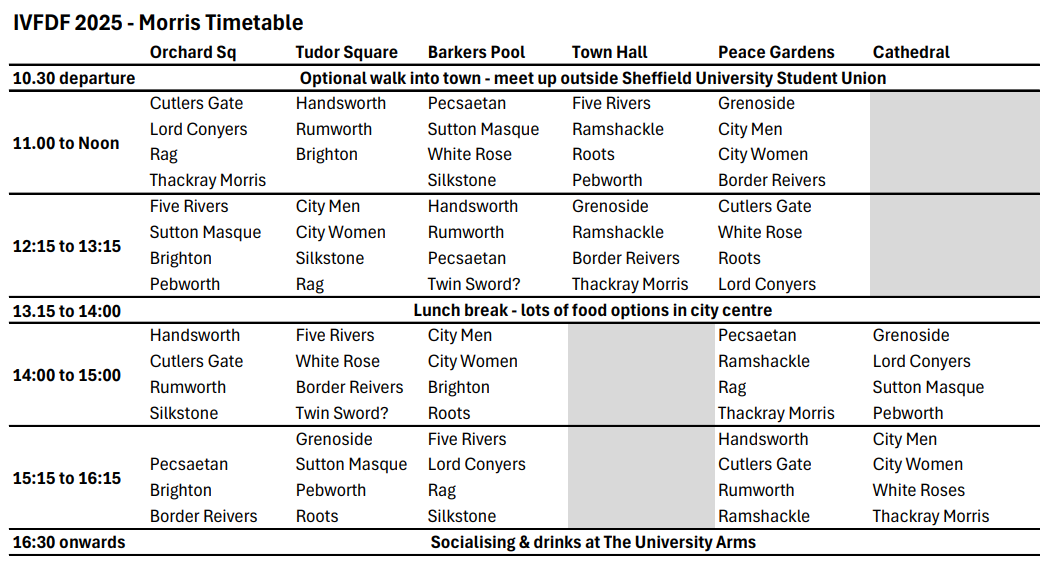
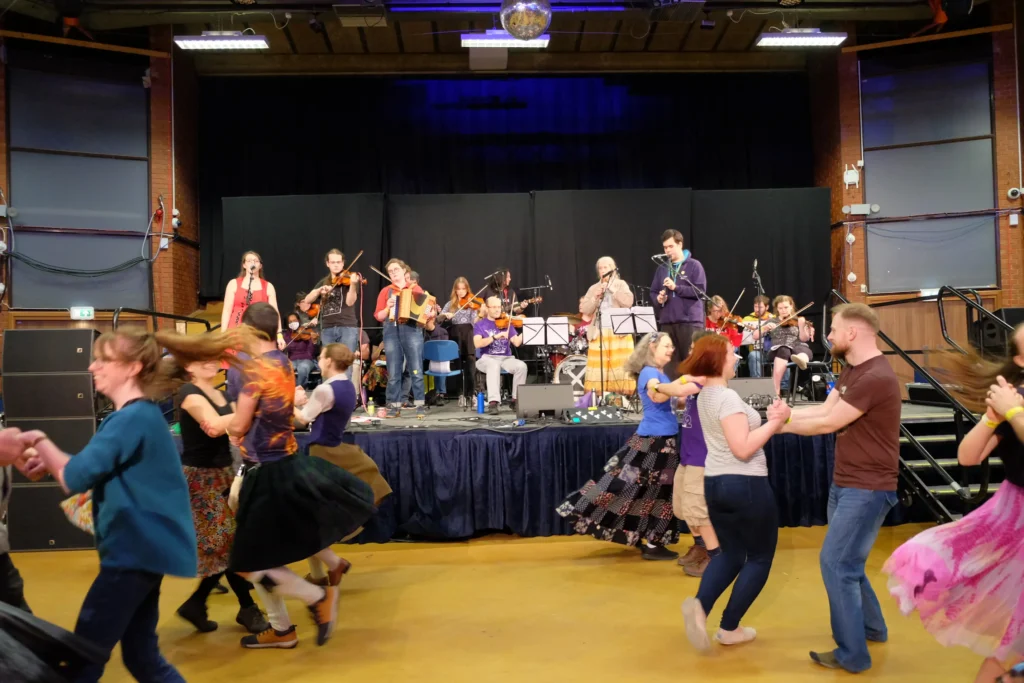
What do all the type of dances mean?
Ceilidh is a traditional British social folk dance. The word “ceilidh” if from Gaelic and many ceilidh dances originate from Ireland or Scotland, but there is also a tradition of English ceilidh and barn dances.
Contra is a traditional American social folk dance; similar to ceilidh, but with an emphasis on flowing movements and continuous momentum. Where the energy in ceilidh is largely “bouncy” and vertical, the energy in contra is more horizontal, with figures flowing into one another.
Playford is English Country Dancing; the kind of dances that were danced at balls in Jane Austen’s time.
Scottish Country Dance is the traditional Scottish County Dancing, very popular worldwide
Bal is a shortening of balfolk, a word used to refer to traditional dances from North-Western Europe. Many of them are couple dances, but there will be group dances also. Unlike ceilidh, contra, Playford and Scottish Country Dance, Bal is not called or taught; however, there will be workshops teaching the dances, and there will be many friendly folks willing to show you on the fly; many of the dances are easy to pick up and very open to improvisation.
Late Night Scratch Dancing is when the floor is handed over to you! Depending on the musicians, dancers and callers present, any and all the above styles may be danced! There are usually multiple spaces available for late night dancing, so if one of the spaces isn’t dancing your preferred style, you can go to the other one. Please be nice to our stewards and the SU security and make sure you vacate the late night dancing area by the designated time.
